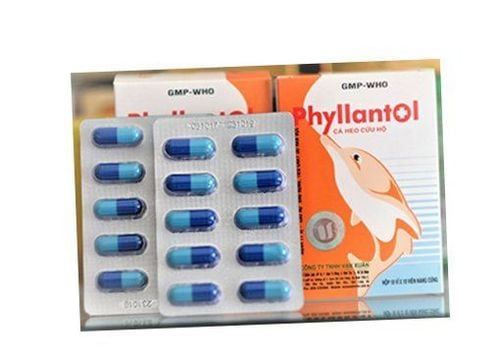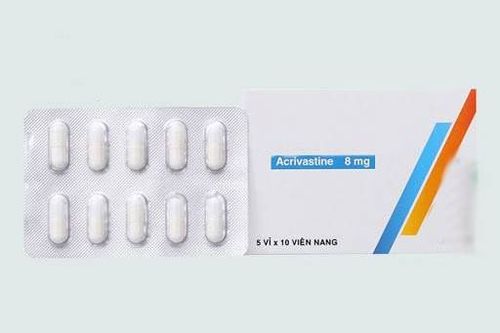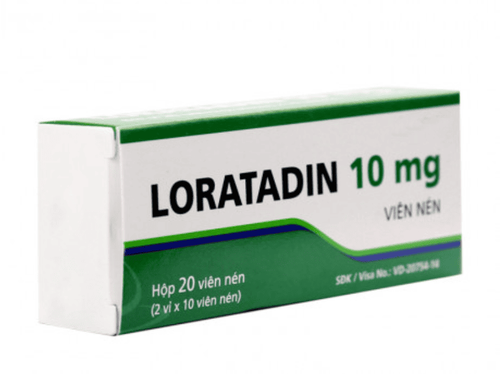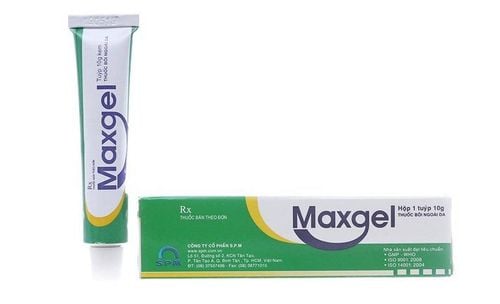This is an automatically translated article.
The drug Tiphadeltacil is made in the form of tablets, with the main ingredient being Dexamethasone. The drug is used in the treatment of allergic conditions, hives, asthma, difficulty breathing, ...
1. What are the effects of Tiphadeltacil?
1 Tiphadeltacil tablet has the main ingredient of 0.5mg Dexamethasone (as Dexamethasone acetate). Dexamethasone is fluomethylprednisolone, a synthetic glucocorticoid and is virtually insoluble in water. Dexamethasone works by binding to receptors in cells, translocating into the cell nucleus, where it affects a number of genes to be translated. This ingredient has good anti-allergic, anti-inflammatory and immunosuppressive effects, and also has an effect on electrolyte balance (very little). In terms of anti-inflammatory activity, Dexamethasone is up to 30 times stronger than hydrocortisone.
Dexamethasone is used orally, topically, intramuscularly, inhaled or topically for the treatment of conditions indicated when corticosteroids are used (except adrenal insufficiency) such as bleeding shock, surgery, Injury or infection, arthritis, cerebral edema due to brain tumor,... With pharmacological doses, systemic use of Dexamethasone causes pituitary suppression leading to the release of corticotropin (ACTH), which causes adrenal cortex The kidneys stop secreting endogenous corticosteroid hormones, causing secondary adrenocortical insufficiency.
Indications for use of Tiphadeltacil:
Treatment of urticaria, allergies, asthma, Quincke's edema, continuous breathing difficulties; Treatment of some chronic obstructive bronchial diseases, purulent meningitis, pulmonary fibrosis, allergic rhinitis, optic neuritis, exacerbation of proctitis bleeding, acute/chronic sinusitis, inflammation joints, polyarthritis; Treatment of skin diseases: Eczema, chronic hepatitis, purpura, Pemphigus, autoimmune activity, brain edema due to tumor or trauma. Contraindications to the use of Tiphadeltacil:
Patients who are sensitive or allergic to drug components; Patients with bacterial and fungal infections are not treated specifically; Patients with systemic fungal infections, Pemphigus and facial shingles, particularly progressive viral diseases, mental status, progressive gastritis, alcoholic cirrhosis, ascites; Patients with acute hepatitis caused by viruses A, B or non-viral, use live virus vaccines.
2. How to use and dose of Tiphadeltacil
Usage: Orally. Tiphadeltacil should be taken after meals.
Dosage:
Adults: Take a dose of 2 - 8 tablets/day, divided into 2 - 3 times/day; Children: Use dose 0.1 - 0.2mg/kg, taken several times a day, 3 to 4 hours apart. Too rapid reduction in the dose of Tiphadeltacil after prolonged treatment can lead to acute adrenal insufficiency, hypotension, and even death. Discontinuation of the drug sometimes causes relapse-like symptoms.
When using an overdose of glucocorticoids, patients can experience acute poisoning or death (rare). There is currently no specific antidote for this condition. There is no indication for the treatment of chronic poisoning, except in cases where the patient is hypersensitive to the pathological corticosteroid, which requires symptomatic treatment. If the patient is in anaphylaxis or has a hypersensitivity reaction, epinephrine, artificial respiration, and aminophyline can be treated. The sick person should also be kept warm and rested in a quiet environment.
3. Tiphadeltacil side effects
When using Tiphadeltacil, patients may experience some side effects such as:
Common:
Electrolyte disturbances: Sodium and water retention, hypokalemia, leading to hypertension and edema; Endocrine and metabolic: Adrenal atrophy, decreased secretion of ACTH, Cushing's syndrome, impaired glucose tolerance, menstrual disorders; Musculoskeletal: osteoporosis, pathological fractures, reversible muscular atrophy, aseptic osteonecrosis, spina bifida; Digestive: Peptic ulcer - duodenal ulcer, perforated ulcer, bleeding ulcer, acute pancreatitis; Skin: Skin atrophy, ecchymosis, erythema, hirsutism; Neurological: Insomnia, euphoria Uncommon:
Hypersensitivity, sometimes anaphylaxis; Nausea, vomiting, hiccups, irritability, appetite, weight gain; Leukocytosis, thromboembolism, aseptic abscess. When experiencing any side effects of Tiphadeltacil, patients should immediately inform their doctor to receive advice on the most appropriate response.
4. Be careful when using Tiphadeltacil
Before and during the use of Tiphadeltacil, patients should note:
In patients with bacterial infection or suspected infection, special attention should be paid and first treatment with specific antibacterial drugs should be considered. This is because the immunosuppressive effect of Dexamethasone can cause exacerbations and spread of infections; Patients with bacterial meningitis should use Dexamethasone before taking specific antibacterial drugs to prevent the risk of encephalitis due to a reaction to bacterial fragments destroyed by antibiotics; In patients with osteoporosis, psychosis, hypertension, recent bowel surgery, peptic ulcer, diabetes, kidney failure, heart failure, tuberculosis,... it is necessary to closely monitor health and treat positive for such diseases if dexamethasone is required; Glucocorticoids may be teratogenic in animal studies. In humans, the drug can reduce placental weight and fetal weight. The drug can also cause adrenal suppression in the newborn if the mother takes it for a long time. Tiphadeltacil should be used with caution in pregnant women. If used, it must be approved by a doctor; Dexamethasone when passed into breast milk can have negative effects on the health of a nursing infant. Therefore, the benefits/risks of drug use in nursing mothers should be weighed. If taking medication, the consent of the doctor must be obtained; Avoid taking Tiphadeltacil at night because it can cause hypotension, affect the ability to drive or use machines.
5. Tiphadeltacil drug interactions
Some drug interactions of Tiphadeltacil include:
Concomitant administration of Dexamethasone (main ingredient of Tiphadeltacil) with barbiturates, rifabutin, rifampicin, carbamazepine, ephedrine, aminoglutethimide, phenytoin may increase corticosteroid clearance, reduce the effect cure; Corticosteroids antagonize the effects of agents that cause hypoglycaemia (including insulin), diuretics and antihypertensives; Corticosteroids also potentiate the hypokalemic effect of loop diuretics, acetazolamide, carbenoxolone; When co-administered with corticosteroids, the potency of coumarin derivatives against coagulation may be increased. Therefore, prothrombin time should be closely monitored to avoid the risk of spontaneous bleeding; When used concomitantly with corticosteroids, clearance of salicylates is increased. Therefore, stopping corticosteroids can lead to salicylate toxicity; Diuretics that lower blood potassium such as furosemide, thiazides and amphotericin B may enhance the hypokalemic effect of glucocorticoids. When prescribed by a doctor to use Tiphadeltacil, patients should strictly follow all instructions on how to use, dose, and time to take the drug. This ensures the best treatment effect and avoids the risk of overdose or dangerous side effects.
Please dial HOTLINE for more information or register for an appointment HERE. Download MyVinmec app to make appointments faster and to manage your bookings easily.













